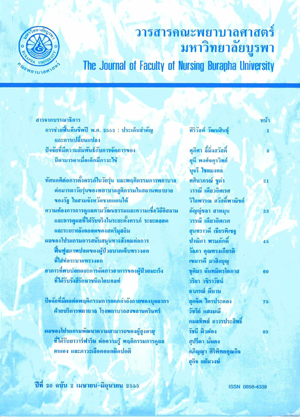ปัจจัยที่มีความสัมพันธ์กับการจัดการของบิดามารดาเมื่อเด็กมีภาวะไข้
คำสำคัญ:
ภาวะไข้ในเด็ก, การจัดการภาวะไข้ในเด็ก, Fever in childhood, Fever managementบทคัดย่อ
การวิจัยครั้งนี้เป็นแบบบรรยายเชิงหาความสัมพันธ์ มีวัตถุประสงค์เพื่อศึกษาความสัมพันธ์ระหว่างความรู้ ความเชื่อ และแหล่งข้อมูล กับการจัดการของบิดามารดาเมื่อเด็กมีภาวะไข้ กลุ่มตัวอย่างเป็นบิดาหรือมารดาของเด็กที่มีภาวะไข้ และเข้ารับการตรวจรักษาในแผนกผู้ป่วยนอก โรงพยาบาลกบินทร์บุรี จังหวัดปราจีนบุรี จำนวนทั้งหมด 76 คน เครื่องมือที่ใช้ในการเก็บรวบรวมข้อมูลประกอบด้วยแบบสอบถามความรู้ในการดูแลเด็กที่มีภาวะไข้แบบสอบถามความเชื่อในการดูแลเด็กที่มีภาวะไข้และแบบสอบถามการจัดการของบิดามารดาเมื่อเด็กมีภาวะไข้มีค่าความเชื่อมั่นเท่ากับ .89, .87 และ .94 ตามลำดับ และค่าดัชนีความตรงเชิงเนื้อหาของแบบสอบถามแต่ละชุดเท่ากับ .93 วิเคราะห์ข้อมูลโดยใช้สถิติพรรณนา ค่าสัมประสิทธิ์สหสัมพันธ์ของเพียร์สัน และค่าสหสัมพันธ์พอยท์ไบซีเรียล
ผลการวิจัยพบว่า บิดามารดามีคะแนนเฉลี่ยความรู้ในการดูแลเด็กที่มีภาวะไข้ในระดับถูกต้องมาก โดยมีค่าเฉลี่ยเท่ากับ 11.11 (S.D. = 2.02, range = 5 – 15) ค่าคะแนนความเชื่อโดยรวมในการดูแลเด็กที่มีภาวะไข้อยู่ในระดับเหมาะสมปานกลาง โดยมีค่าเฉลี่ยเท่ากับ 43.36 (S.D. = 3.26, range = 33 -52) และคะแนนการจัดการโดยรวมของบิดามารดาเมื่อเด็กมีภาวะไข้อยู่ในระดับเหมาะสมปานกลาง โดยมีค่าเฉลี่ยเท่ากับ 51.04 (S.D. = 6.05, range = 36 – 68) โดยความเชื่อในการดูแลเด็กที่มีภาวะไข้มีความสัมพันธ์ทางบวกระดับปานกลางกับการจัดการของบิดามารดาเมื่อเด็กมีภาวะไข้อย่างมีนัยสำคัญทางสถิติ (r = .431,p< .01)ความรู้ในการดูแลเด็กที่มีภาวะไข้และแหล่งข้อมูลในการดูแลเด็กที่มีภาวะไข้ไม่มีความสัมพันธ์กับการจัดการของบิดามารดาเมื่อเด็กมีภาวะไข้(p> .05)
ผลการวิจัยครั้งนี้ชี้ให้เห็นว่า พยาบาลควรส่งเสริมให้บิดามารดามีความเชื่อที่เหมาะสมเกี่ยวกับภาวะไข้ในเด็ก ซึ่งจะส่งผลให้บิดามารดามีการจัดการภาวะไข้ในเด็กได้อย่างมีประสิทธิภาพ เพื่อลดอันตรายจากภาวะไข้สูงในเด็ก
The purpose of this descriptive correlational study was to examine relationships between knowledge about childhood fever management, beliefabout childhood fever management, information sources about childhood fever management and parents’ pediatric fever management. Sample included 76 parents of children with fever receiving service at outpatient department, the Kabinburi hospital, Prachin Buri province. The study instruments composed of the demographic questionnaire, the knowledge about childhood fever management questionnaire, the belief about childhood fever management questionnaire, and the parents’ pediatric fever management questionnaire. Internal consistency reliability of instruments were .89, .87 and .94, respectively. The Content Validity Index (CVI) of each instrument was .93. Data were analyzed by using descriptive statistics, Pearson correlation coefficients, and Point biserial correlation.
The results revealed that total mean scoreof knowledge about childhood fever management was 11.11 (S.D. = 2.02, range = 5 – 15), total mean score of belief about childhood fever management was 43.36 (S.D. = 3.26, range = 33 -52), and total mean score of parents’ pediatric fever management was 51.04 (S.D. = 6.05, range = 36 – 68). Belief about childhood fever management had a moderately positive relationship with parent’s childhood fever management (r = .431,p< .01). There was no significant associationbetween knowledge about childhood fever management and information sources about childhood fever management to parent’s pediatric fever management at the level of .05.
These findings suggest that nurses should encourage parents to have appropriate beliefs aboutpediatric fever management in order to manage the fevere ffectively and decrease risk of high fever in children.





